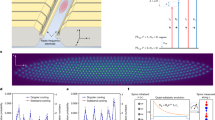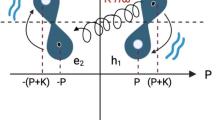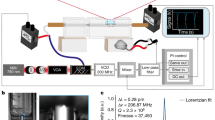Abstract
A MULTICHANNEL analyser has been added to our electron spin resonance spectrometer to be used as a computer of average transients1. This communication describes the elements of the system and some of the important advantages that a versatile analyser can provide. Briefly, the principle of the computer of average transients is that successive sweeps of a spectrum are added in a multichannel memory system, so that the signal, coherent with each sweep, adds linearly in the memory, while the noise, which is random, adds in quadrature. This results in an improvement of signal-to-noise ratio after N sweeps of √N.
This is a preview of subscription content, access via your institution
Access options
Subscribe to this journal
Receive 51 print issues and online access
$199.00 per year
only $3.90 per issue
Buy this article
- Purchase on Springer Link
- Instant access to full article PDF
Prices may be subject to local taxes which are calculated during checkout
Similar content being viewed by others
References
Klein, M. P., and Barton, G. W., Rev. Sci. Instrum., 34, 754 (1963).
Cook, P., and Mallard, J. R., Nature, 198, 145 (1963).
Kent, M., and Mallard, J. R., Nature, 204, 396 (1964).
Author information
Authors and Affiliations
Rights and permissions
About this article
Cite this article
KENT, M., MALLARD, J. Advantages resulting from the Addition of a Versatile Multichannel Analyser to an Electron Spin Resonance Spectrometer. Nature 207, 1195–1196 (1965). https://doi.org/10.1038/2071195a0
Published:
Issue Date:
DOI: https://doi.org/10.1038/2071195a0
This article is cited by
Comments
By submitting a comment you agree to abide by our Terms and Community Guidelines. If you find something abusive or that does not comply with our terms or guidelines please flag it as inappropriate.



